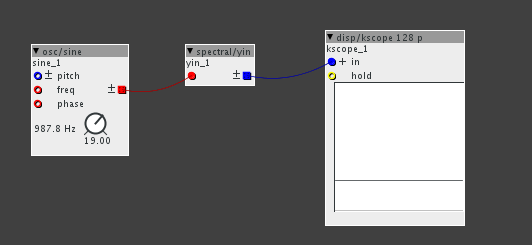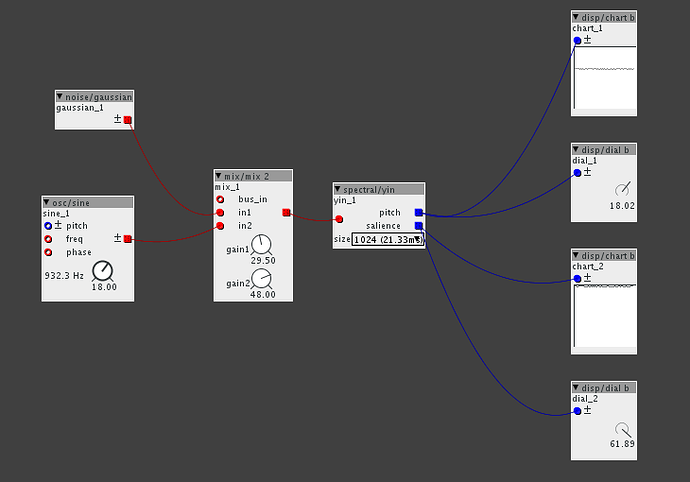Hey there! I want to use the Yin object for creating some kind of guitar bass synthesizer. Unfortunately I behaves a bit buggy. When I first load it into a project it works fine. But when I change something in the patch it won't work anymore. I try to go in live mode and takes some seconds and then disconnects axoloti. When I reconnect then, sometimes I am able to go live.
With bigger patches nothing works like it should anymore...
This is the axoloti log when I try to use Yin:
instance added, type yin
Generate code complete
Start creating directory on sdcard : /untitled
creating dir: /untitled
Done creating directory
Changing working directory on sdcard : /untitled
Change working directory: /untitled
Done changing working directory
Start compiling patch
Compiling patch... with /Applications/Axoloti.app/Contents/Java/firmware
BDIR = /Users/Simon/Documents/axoloti/build
FIRMWARE = .
RM
rm -f /Users/Simon/Documents/axoloti/build/xpatch.o /Users/Simon/Documents/axoloti/build/xpatch.elf /Users/Simon/Documents/axoloti/build/xpatch.bin /Users/Simon/Documents/axoloti/build/xpatch.d /Users/Simon/Documents/axoloti/build/xpatch.map /Users/Simon/Documents/axoloti/build/xpatch.lst
APP
arm-none-eabi-g++ -nostdlib -fno-exceptions -fno-rtti -mcpu=cortex-m4 -O3 -fomit-frame-pointer -falign-functions=16 -mfloat-abi=hard -mfpu=fpv4-sp-d16 -fsingle-precision-constant -Wunused-parameter -DCORTEX_USE_FPU=TRUE -DTHUMB_PRESENT -mno-thumb-interwork -DTHUMB_NO_INTERWORKING -mthumb -DTHUMB -std=c++11 -DARM_MATH_CM4 -D__FPU_PRESENT -H -I/Applications/Axoloti.app/Contents/Java/CMSIS/Include -I/Applications/Axoloti.app/Contents/Java/chibios/os/ports/common/ARMCMx/CMSIS/include -I/Applications/Axoloti.app/Contents/Java/chibios/os/ports/common/ARMCMx -I/Applications/Axoloti.app/Contents/Java/chibios/os/ports/GCC/ARMCMx -I/Applications/Axoloti.app/Contents/Java/chibios/os/ports/GCC/ARMCMx/STM32F4xx -I/Applications/Axoloti.app/Contents/Java/chibios/os/kernel/include -I/Applications/Axoloti.app/Contents/Java/chibios/os/hal/include -I/Applications/Axoloti.app/Contents/Java/chibios/os/hal/platforms/STM32F4xx -I/Applications/Axoloti.app/Contents/Java/chibios/os/hal/platforms/STM32 -I/Applications/Axoloti.app/Contents/Java/chibios/os/hal/platforms/STM32/GPIOv2 -I/Applications/Axoloti.app/Contents/Java/chibios/os/hal/platforms/STM32/I2Cv1 -I/Applications/Axoloti.app/Contents/Java/chibios/os/hal/platforms/STM32/OTGv1 -I/Applications/Axoloti.app/Contents/Java/chibios/os/hal/platforms/STM32/RTCv2 -I/Applications/Axoloti.app/Contents/Java/chibios/os/hal/platforms/STM32/SPIv1 -I/Applications/Axoloti.app/Contents/Java/chibios/os/hal/platforms/STM32/TIMv1 -I/Applications/Axoloti.app/Contents/Java/chibios/os/hal/platforms/STM32/USARTv1 -I/Applications/Axoloti.app/Contents/Java/chibios/boards/ST_STM32F4_DISCOVERY -I/Applications/Axoloti.app/Contents/Java/chibios/ext/fatfs/src -I. -I/Applications/Axoloti.app/Contents/Java/chibios -Winvalid-pch -MD -MP --include /Users/Simon/Documents/axoloti/build/xpatch.h -c /Users/Simon/Documents/axoloti/build/xpatch.cpp -o /Users/Simon/Documents/axoloti/build/xpatch.o
! /Users/Simon/Documents/axoloti/build/xpatch.h.gch
LINK
arm-none-eabi-gcc -nostartfiles -Tramlink.ld -mcpu=cortex-m4 -mfloat-abi=hard -mfpu=fpv4-sp-d16 -mthumb -mno-thumb-interwork /Users/Simon/Documents/axoloti/build/xpatch.o -Wl,-Map=/Users/Simon/Documents/axoloti/build/xpatch.map,--cref,--just-symbols=./build/axoloti.elf -o /Users/Simon/Documents/axoloti/build/xpatch.elf
BIN
arm-none-eabi-objcopy -O binary /Users/Simon/Documents/axoloti/build/xpatch.elf /Users/Simon/Documents/axoloti/build/xpatch.bin
Done compiling patch
Start uploading patch
bin path: /Users/Simon/Documents/axoloti/build/xpatch.bin
block uploaded @ 0x20011000 length 4116
Done uploading patch
Start starting patch
Done starting patch
Start locking
Done locking
Generate code complete
Start creating directory on sdcard : /untitled
creating dir: /untitled
Done creating directory
Changing working directory on sdcard : /untitled
Change working directory: /untitled
Done changing working directory
Start compiling patch
Compiling patch... with /Applications/Axoloti.app/Contents/Java/firmware
BDIR = /Users/Simon/Documents/axoloti/build
FIRMWARE = .
RM
rm -f /Users/Simon/Documents/axoloti/build/xpatch.o /Users/Simon/Documents/axoloti/build/xpatch.elf /Users/Simon/Documents/axoloti/build/xpatch.bin /Users/Simon/Documents/axoloti/build/xpatch.d /Users/Simon/Documents/axoloti/build/xpatch.map /Users/Simon/Documents/axoloti/build/xpatch.lst
APP
arm-none-eabi-g++ -nostdlib -fno-exceptions -fno-rtti -mcpu=cortex-m4 -O3 -fomit-frame-pointer -falign-functions=16 -mfloat-abi=hard -mfpu=fpv4-sp-d16 -fsingle-precision-constant -Wunused-parameter -DCORTEX_USE_FPU=TRUE -DTHUMB_PRESENT -mno-thumb-interwork -DTHUMB_NO_INTERWORKING -mthumb -DTHUMB -std=c++11 -DARM_MATH_CM4 -D__FPU_PRESENT -H -I/Applications/Axoloti.app/Contents/Java/CMSIS/Include -I/Applications/Axoloti.app/Contents/Java/chibios/os/ports/common/ARMCMx/CMSIS/include -I/Applications/Axoloti.app/Contents/Java/chibios/os/ports/common/ARMCMx -I/Applications/Axoloti.app/Contents/Java/chibios/os/ports/GCC/ARMCMx -I/Applications/Axoloti.app/Contents/Java/chibios/os/ports/GCC/ARMCMx/STM32F4xx -I/Applications/Axoloti.app/Contents/Java/chibios/os/kernel/include -I/Applications/Axoloti.app/Contents/Java/chibios/os/hal/include -I/Applications/Axoloti.app/Contents/Java/chibios/os/hal/platforms/STM32F4xx -I/Applications/Axoloti.app/Contents/Java/chibios/os/hal/platforms/STM32 -I/Applications/Axoloti.app/Contents/Java/chibios/os/hal/platforms/STM32/GPIOv2 -I/Applications/Axoloti.app/Contents/Java/chibios/os/hal/platforms/STM32/I2Cv1 -I/Applications/Axoloti.app/Contents/Java/chibios/os/hal/platforms/STM32/OTGv1 -I/Applications/Axoloti.app/Contents/Java/chibios/os/hal/platforms/STM32/RTCv2 -I/Applications/Axoloti.app/Contents/Java/chibios/os/hal/platforms/STM32/SPIv1 -I/Applications/Axoloti.app/Contents/Java/chibios/os/hal/platforms/STM32/TIMv1 -I/Applications/Axoloti.app/Contents/Java/chibios/os/hal/platforms/STM32/USARTv1 -I/Applications/Axoloti.app/Contents/Java/chibios/boards/ST_STM32F4_DISCOVERY -I/Applications/Axoloti.app/Contents/Java/chibios/ext/fatfs/src -I. -I/Applications/Axoloti.app/Contents/Java/chibios -Winvalid-pch -MD -MP --include /Users/Simon/Documents/axoloti/build/xpatch.h -c /Users/Simon/Documents/axoloti/build/xpatch.cpp -o /Users/Simon/Documents/axoloti/build/xpatch.o
! /Users/Simon/Documents/axoloti/build/xpatch.h.gch
LINK
arm-none-eabi-gcc -nostartfiles -Tramlink.ld -mcpu=cortex-m4 -mfloat-abi=hard -mfpu=fpv4-sp-d16 -mthumb -mno-thumb-interwork /Users/Simon/Documents/axoloti/build/xpatch.o -Wl,-Map=/Users/Simon/Documents/axoloti/build/xpatch.map,--cref,--just-symbols=./build/axoloti.elf -o /Users/Simon/Documents/axoloti/build/xpatch.elf
BIN
arm-none-eabi-objcopy -O binary /Users/Simon/Documents/axoloti/build/xpatch.elf /Users/Simon/Documents/axoloti/build/xpatch.bin
Done compiling patch
Start uploading patch
bin path: /Users/Simon/Documents/axoloti/build/xpatch.bin
block uploaded @ 0x20011000 length 4116
Done uploading patch
Start starting patch
patch start taking too long, disconnecting
Disconnect request
Done starting patch
USB device found
connected
invalid CPU serial number, invalid protocol?, update firmware
Cannot obtain signature, upgrade firmware?
Ping: WaitSync Timeout, disconnecting now
Disconnect request
Ping: WaitSync Timeout, disconnecting now
Ping: WaitSync Timeout, disconnecting now
Ping: WaitSync Timeout, disconnecting now
Ping: WaitSync Timeout, disconnecting now
Ping: WaitSync Timeout, disconnecting now
Ping: WaitSync Timeout, disconnecting now
Ping: WaitSync Timeout, disconnecting now
Ping: WaitSync Timeout, disconnecting now
Ping: WaitSync Timeout, disconnecting now
Ping: WaitSync Timeout, disconnecting now
Ping: WaitSync Timeout, disconnecting now
Ping: WaitSync Timeout, disconnecting now
Ping: WaitSync Timeout, disconnecting now
USB device found
connected
java.lang.Exception: cpuserial has wrong length
java.lang.Exception: cpuserial has wrong length
at axoloti.HWSignature.Verify(HWSignature.java:96)
at axoloti.USBBulkConnection.connect(USBBulkConnection.java:316)
at axoloti.MainFrame.jCheckBoxConnectActionPerformed(MainFrame.java:651)
at axoloti.MainFrame.access$400(MainFrame.java:79)
at axoloti.MainFrame$6.actionPerformed(MainFrame.java:427)
at javax.swing.AbstractButton.fireActionPerformed(AbstractButton.java:2022)
at javax.swing.AbstractButton$Handler.actionPerformed(AbstractButton.java:2348)
at javax.swing.DefaultButtonModel.fireActionPerformed(DefaultButtonModel.java:402)
at javax.swing.JToggleButton$ToggleButtonModel.setPressed(JToggleButton.java:308)
at javax.swing.plaf.basic.BasicButtonListener.mouseReleased(BasicButtonListener.java:252)
at java.awt.Component.processMouseEvent(Component.java:6535)
at javax.swing.JComponent.processMouseEvent(JComponent.java:3324)
at java.awt.Component.processEvent(Component.java:6300)
at java.awt.Container.processEvent(Container.java:2236)
at java.awt.Component.dispatchEventImpl(Component.java:4891)
at java.awt.Container.dispatchEventImpl(Container.java:2294)
at java.awt.Component.dispatchEvent(Component.java:4713)
at java.awt.LightweightDispatcher.retargetMouseEvent(Container.java:4888)
at java.awt.LightweightDispatcher.processMouseEvent(Container.java:4525)
at java.awt.LightweightDispatcher.dispatchEvent(Container.java:4466)
at java.awt.Container.dispatchEventImpl(Container.java:2280)
at java.awt.Window.dispatchEventImpl(Window.java:2750)
at java.awt.Component.dispatchEvent(Component.java:4713)
at java.awt.EventQueue.dispatchEventImpl(EventQueue.java:758)
at java.awt.EventQueue.access$500(EventQueue.java:97)
at java.awt.EventQueue$3.run(EventQueue.java:709)
at java.awt.EventQueue$3.run(EventQueue.java:703)
at java.security.AccessController.doPrivileged(Native Method)
at java.security.ProtectionDomain$JavaSecurityAccessImpl.doIntersectionPrivilege(ProtectionDomain.java:76)
at java.security.ProtectionDomain$JavaSecurityAccessImpl.doIntersectionPrivilege(ProtectionDomain.java:86)
at java.awt.EventQueue$4.run(EventQueue.java:731)
at java.awt.EventQueue$4.run(EventQueue.java:729)
at java.security.AccessController.doPrivileged(Native Method)
at java.security.ProtectionDomain$JavaSecurityAccessImpl.doIntersectionPrivilege(ProtectionDomain.java:76)
at java.awt.EventQueue.dispatchEvent(EventQueue.java:728)
at java.awt.EventDispatchThread.pumpOneEventForFilters(EventDispatchThread.java:201)
at java.awt.EventDispatchThread.pumpEventsForFilter(EventDispatchThread.java:116)
at java.awt.EventDispatchThread.pumpEventsForHierarchy(EventDispatchThread.java:105)
at java.awt.EventDispatchThread.pumpEvents(EventDispatchThread.java:101)
at java.awt.EventDispatchThread.pumpEvents(EventDispatchThread.java:93)
at java.awt.EventDispatchThread.run(EventDispatchThread.java:82)
Ping: WaitSync Timeout, disconnecting now
Disconnect request
Ping: WaitSync Timeout, disconnecting now



